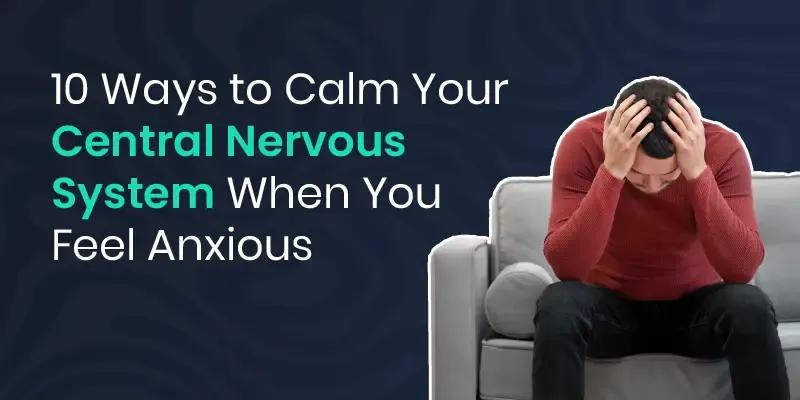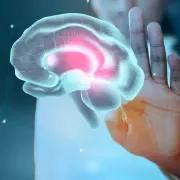10 Ways to Calm Your Central Nervous System When You Feel Anxious
In This Article
10 Ways to Calm Your Central Nervous System When You Feel Anxious
Ashitha Kareem
Updated on June 10, 2024
Medically verified by Dr. Pournami
Fact checked by Dr. Arya

Neurology
8 min read
Anxiety and depression are common symptoms faced by many. Work pressure, societal expectations, relationships dilemma and even the digital world root to the cause of anxiety.
It is important to have a healthy mind for a healthy body. Anxiety can destroy both the mental health and physical health of a person.
Wondering how to keep calm in various situations? How would you deal with anxiety and keep your central nervous system in good health?
Let us discuss the ways to handle anxiety for better health.
What is CNS?
The central nervous system (CNS) is a part of the nervous system. It is made up of the brain and spinal cord.
Brain needs to be in constant contact with the other parts of the body. It is the duty of CNS to send out signals and receive feedback from the senses.
Simply, CNS carries electrical and chemical messages to and from the brain, to the rest of the body and is called the processing centre of the body.
When anxiety hits CNS it disrupts normal functioning of our body.
Hence for proper functioning of the body, it is important to relieve anxieties and keep CNS calm and healthy.
10 Ways to Calm Your Central Nervous System When You Feel Anxious
It is clear that stress is detrimental to both the fitness of our body and mind. It is important to manage the fitness of both. The key is to reverse the effects before they cause permanent damages.
Here are a few methods to alleviate the effects and reduce anxiety.
1. Relaxation, Meditation and Mindfulness (R.M.M)
R.M.M is the most basic approach for reducing anxiety. Nearly all the processes are blends of this common approach. Different techniques specialise on different patterns of effects to get the expected results.
The first level primarily focuses on Mindful Basic Relaxation. It includes letting go of the day’s stressor, physical relaxation, and finally relaxing the mind.
The consecutive levels are Mindful Quiet Focus, Mindful Awakening, Mindful Deepening, and Mindful Transformation/Transcendence.
2. Deep Breathing
Deep Breathing is considered one of the most effective ways in alleviation of stress and anxiety.
Taking deep breaths helps calm down by regulating the brain signals. Deep breath increases the oxygen intake in the body. The abundance of oxygen lowers the blood pressure and heart rate.
Doing yoga can have a great impact on the body. It helps in calming down the central nervous system. It gives great importance in breathing techniques.
Studies show that the respiratory rhythm affects the functioning of the central nervous system (CNS).
Yoga relaxation training normalises the function of the autonomic nervous system by balancing both sympathetic and parasympathetic indices. It has been shown to positively affect immune function, hypertension, asthma, and stress-induced psychological disorders.
Pranayama is a yogic method that helps in balancing the autonomic nervous system.
Some of the pranayama breathing techniques include
- Yogic breath (Dirgha pranayama )
- Victorious breath (Ujjayi pranayama )
- Alternate nostril breathing (Nadi shodhana )
- Viloma pranayama etc.
Slow Pranayama appears to shift the autonomic nervous system from the fight or flight sympathetic to the calming parasympathetic state and
The 4-7-8 breathing technique is a form of pranayama. The 4-7-8 breathing technique involves breathing in for 4 seconds, holding the breath for 7 seconds, and exhaling for 8 seconds. This breathing pattern aims to reduce anxiety or help people get to sleep.
3. Progressive Muscle Relaxation (PMR)
PMR is also called Jacobson's relaxation technique. As the name suggests it is a deep relaxation technique using the progressive contraction and relaxation of muscles.
It involves tensing each muscle group in the body then slowly relaxing them. It is to be noted that the tense should not be to the point of strain.
The theory behind the exercise is that you cannot have the feeling of relaxation along with anxiety symptoms. Here, releasing physical tension eases anxiety and stress.
- For example, you can start with a forehead squeeze.
- Hold it for 15 seconds before releasing. Take a 30 second relaxing period.
- You need to do the same with your jaw.
- Tighten the jaw for 15 seconds, hold and relax.
- Continue with other parts of the body in the same way.
4. Mindfulness Meditation
Meditative techniques are categorised as emphasising mindfulness, concentration, and automatic self-transcendence.
Mindfulness-based stress reduction emphasises training in present-focused awareness or mindfulness. Research shows mindful meditation shows improvements in stress/distress and the mental health component of health-related quality of life.
 10 min read
10 min read10 Neurological Benefits of Exercise - Positive Psychology
 10 min read
10 min readChoosing the Right Neurology Hospital: Factors to Consider for Patients and Families
 10 min read
10 min readTop 10 Neurology Hospitals in India
Get a Callback Now
5. Regular Physical Activity
Regular Physical Activity can improve self-confidence and can act as a stress reliever. Any form of exercise, from aerobics to yoga, can act as a stress reliever. Exercise and direct stress relief benefits:
- Elevate Endorphin level: Physical activities increase production of endorphins. They are brain's feel-good neurotransmitters and are natural painkillers.
- Reduces negative impact of stress: Exercise can reduce stress and related health effects. They strengthen the immune responses and other body functions.
- Improves your mood: Regular exercises improve one’s mental health and reduce mild anxiety and depression.
6. Adequate Sleep
Adequate Sleep plays a critical role in managing stress and anxiety. Poor sleep causes anxiety, while anxiety can disrupt one’s sleep.
Different types of anxiety disorders impact people and their sleep differently. To fall asleep with sleep disorders people can try:
- Cognitive behavioural therapy for insomnia (CBT-I)
- Approved medication treatments including anti-anxiety drugs, antidepressants, and beta-blockers
- Building healthy sleep habits
- Eliminating sleep disruptions like light, noise, mobile phones etc...
- Avoiding caffeine and alcohols especially near bedtime.
- Try relaxation exercises
7. Healthy Eating Habits
Healthy food habits are always important for a healthy body. Here are some nerve calming foods to fight against depression and anxiety.
- Leafy greens: They are rich in fibre, folate, iron and other micronutrients.Adding different coloured leafy greens in your meal as salads or soups can reduce anxiety
- Broccoli: Broccoli, cauliflower, brussel sprouts and cabbage, are rich in sulforaphane. So they have anti-inflammatory properties which help in decreased production of stress inducing hormones.
- Avocados: Rich in fibre, potassium, folate, vitamin A and magnification helps in re anxiety.
- Green tea : They have antioxidants and have calming effects. But the caffeine content can cause adverse effects in the sleep cycle. So make sure to keep the consumption under check.
The central nervous system cannot function properly without the amino acids that are found in protein-rich foods.
These foods promote the production of neurotransmitters that our brain uses to make the chemicals that regulate mood, sleep, and stress responses.Therefore protein consumption is highly recommended.
Basically a balanced diet can help you control your health and contribute to your overall health.
8. Limiting Stimulants
Coffee and other caffeine are stimulants. Although for most of the people the caffeine consumption is benign there is a small but important subset of caffeine consumption that can be interfering.
Insomnia, gastrointestinal troubles and anxiety, can be caused by or exacerbated by caffeine.
9. Connecting with Others
Humans are social beings. Social support is vital for managing stress. Good relationships or a group of people with common interests complement each other.
People with high levels of social support seem to be more resilient in the face of stressful situations.
10. Seek Professional Advice Professional advice is always better than self treatment Experience and expert advice from a professional perspective helps in detecting the problems and getting personalised suggestions.
We understand that both mental and physical health influences the central nervous system. From a social gathering to yoga,or self reflection to biofeedback the healing journey differs from person to person.
There are some solutions helping us discover our emotions and stabilise them. We can also find mentors to assist us with yoga,tai chi and exercise. Regular follow ups are always good for consistent goals.
Remember, taking proactive steps towards managing anxiety not only benefits our CNS but also enhances our overall quality of life.
The central nervous system (CNS) is a part of the nervous system. It consists of the brain and spinal cord.
Anxiety disrupts proper functioning of CNS. It affects both mental and physical health.
Relaxation, Meditation, and Mindfulness (R.M.M); Deep Breathing; Progressive Muscle Relaxation (PMR); Mindfulness Meditation; Regular Physical Activity; Adequate Sleep; Healthy Eating Habits; Limiting Stimulants; Connecting with Others; and Seeking Profes
These methods help in improving mood, reducing stress, enhancing immune function, and maintaining a balanced autonomic nervous system.
Maintaining CNS health leads to overall well being.
Source Links
National Library of Science
University of Toledo
JAMA Internal Medicine
Sleep Foundation
The Washington Post
Illuminate Therapy
Hopkins Medicine
American Psychological Association

